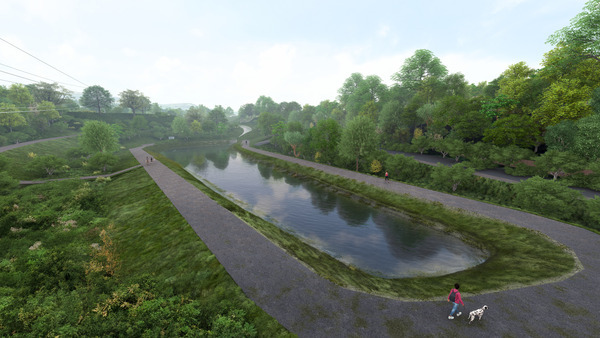A NEW pond is to be created at a former industrial wasteland to hold water that could overwhelm an existing culvert.
The British, a former ironworks, in Talywaun, Pontypool has been described as the largest remaining site of industrial dereliction in south east Wales and was decommissioned in the mid-1980s and bought by Torfaen Borough Council in 2016.
Its planning committee has now given unanimous approval for the council’s own application to redirect two watercourses on the site to create an attenuation pond to hold water and release it at a controlled level through an existing culvert assessed as unable to cope with a one-in-100-year storm. The water will eventually feed into the Afon Llwyd and the Usk.
Planning officer Tom Braithwaite told the committee The British is identified as a strategic area in the council’s current local development plan to be developed in two stages; a land reclamation scheme and future mixed use development.
Mr Braithwaite redirecting the Blaengafog and Castle Wood streams and creating a pond form part of the land reclamation programme.
The full council approved funding of up to £4.6 million for the work in July last year at the same time it also gave the go-ahead for a legally binding agreement with private developer IDRIS to bring the land into commercial use, including clean energy generation.
Mr Braithwaite said material from creating the new channels for the streams and digging the new pond would be redistributed to three main tip off areas on the site that will be no higher than three metres and left to naturally regenerate.
A new three-metre wide access track will also be constructed, running from the Big Arch, alongside Lodge Road the B4246, at the southern end of the site to Farm Road at the west. The track will be filled with stone to reduce its visual impact but strong enough to be used by maintenance vehicles.
Upper Cwmbran Labour member Steve Evans said he was concerned about safety of the new pond and asked what safety measures would be put in place.
He said: “I’m seriously worried that a young child or an animal could end up in that water if there’s nothing there to prevent them going in.”
Councillors were told the council will “fully consider” all health and safety aspects while Mr Braithwaite said the plans are “visually acceptable” and fencing wasn’t desired with the steep banking also intended to discourage people from entering the water.
Pontypool Labour member Gaynor James said she supported the scheme and said: “How many open points of water have we got in Torfaen or the UK? You can’t be fencing them all off, they’ve all got their own risks and always will.”
Pontnewydd Labour councillor Stuart Ashley said: “Hopefully people will have the good sense not to get into the water, it is cold water from the mines, not the stuff you want to get into.”
He described The British as “absolutely delightful” with skylarks among species there and asked how the council would ensure “we don’t lose what we’ve got up there while work is being done”.
Cllr Ashley also suggested the pond could help address the identified shortage of water to feed the Monmouthshire and Brecon Canal. He said: “This could make a source of water for the canal, hopefully this will be a good thing.”
Mr Braithwaite acknowledged there would be some loss of ecological features that have developed when the site has been left unmanaged but said its also anticipated the pond will create new habitats with the potential for greater foraging for bats identified by the council’s ecologist. The pond, which will have grass at its bed, will also help with natural filtration of the water that is released into the rivers.
IDRIS intends developing energy on site, from wind and from watercourses, which would be used by companies based there, including those involved in growing plants using hydroponics. Excess energy could be sold to the National Grid.

